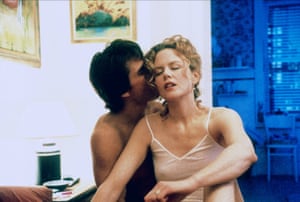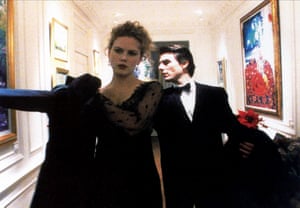Eyes Wide Shut review – chilling secrecy, quaintly soft-porn sex

Eyes Wide Shut, now on rerelease, is fascinating, flawed late Stanley Kubrick, his final film before his death in 1999 at the age of 70. It was adapted from Arthur Schnitzler’s Traumnovelle, or Dream Story, published in 1926 and originally set in Vienna. The film is a tale of sexual obsession among modern-day Manhattan’s wealthy and powerful classes and I originally valued it for its satirical potency, formal control and dreamlike self-possession, all of which are bound up in a certain kind of deadpan absurdity and soft-porn seriousness.
Tom Cruise plays Bill Harford, a well-off New York doctor with a fashionable clientele and a magnificent apartment in Central Park West, happily married to beautiful Alice (Nicole Kidman) a former art gallery director, now a stay-at-home mum to their young daughter. (In the book, they are Jewish, an important part of the doctor’s alienation. Not here.) Unsettled by each other’s flirtatious behaviour at a swell party given by a wealthy patient, Victor Ziegler (Sydney Pollack), and by a consumption of champagne and weed, they later have a furious row in which Alice defiantly confesses her lustful thoughts for a certain other man in her past, and Bill then finds himself on a nighttime odyssey, searching for extramarital adventure and gatecrashing a sinister masked orgy, to which he gains admittance by murmuring the (ironic) password “Fidelio”.
This revival comes with a brief documentary short about the film, Never Just a Dream, with interviewees including his longtime collaborator, executive producer and brother-in-law Jan Harlan — but not his widow Christiane, and not his most important collaborator, screenwriter Frederic Raphael. It might be time to reissue Raphael’s 1999 memoir of working with Kubrick, Eyes Wide Open, in which Raphael amusingly hints that the tense mood of Cruise’s cab ride out to the creepy orgy mansion was inspired by his own minicab journeys from St Albans railway station to the famed seclusion of Kubrick’s Hertfordshire country home for script discussions.
The title, Eyes Wide Shut, was Kubrick’s, and in my original piece, I wondered whether it related to the idea of imaginary sexual transgression being as potent as real, waking transgressions. In dreams you see and know things clearly, with your eyes wide shut. It’s only now that I can see another comparison that was always under my nose: Malcolm McDowell’s eyes being clipped wide open in A Clockwork Orange, being forced to watch something horrible. There are other visual echoes, such as the eerie emptiness of the elevator lobbies like those in The Shining – which are part of the film’s artificiality and theatricality, mocked a little by the film’s denigrators at the time, but a part of the hallucinatory effect. Then there is the party scene at the beginning, like something from The Shining, where Alice meets her predatory Hungarian suitor (Sky du Mont) who could almost be a ghost. Kubrick’s use of Stravinsky’s Waltz from his Jazz Suite shows his sweet tooth for mainstream classical-music themes, and his predilection for softcore female nudity is a characteristic thought a bit dated in 1999.
Perhaps what we felt was contrived was that orgy scene, although it is disquieting and strange in the Hammer-horror way that originally impressed me. But by 1999, Bret Easton Ellis’s American Psycho had upped the ante on these ideas of Manhattan super-wealth and depravity, and in comparison, Eyes Wide Shut seemed a tad quaint. Yet now, in the age of Epstein, we can see that it was not so far-fetched to imagine elaborate clubs in which the rich and powerful can disport themselves and exploit the vulnerable. What comes across even more strongly about Eyes Wide Shut now is its chilling emphasis on ruling-class secrecy. This film inspired Jonathan Glazer’s Birth (2004), itself underappreciated at the time.
Cruise and Kidman heartfelt and fervent performances (although the flickering black-and-white moments showing her imagined sexual indulgence don’t work). There are tears, and Cruise in particular lays himself open in that fiercely committed way that he tries everything as an actor. Did their actual marital disputes resemble what happen in this film? Maybe. They were divorced two years after this came out, with much gossip about whether the film had accentuated their discontents. Pollack’s performance as Ziegler is thrillingly cynical and disillusioned.






.jpeg)
Comments
Post a Comment